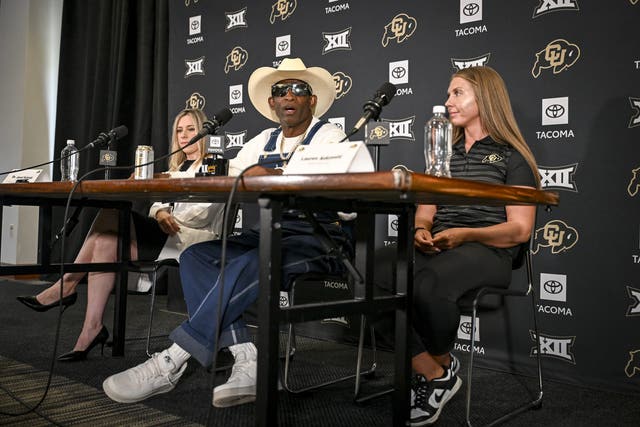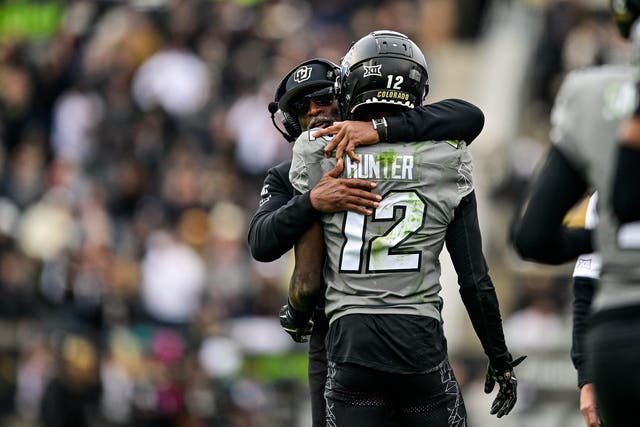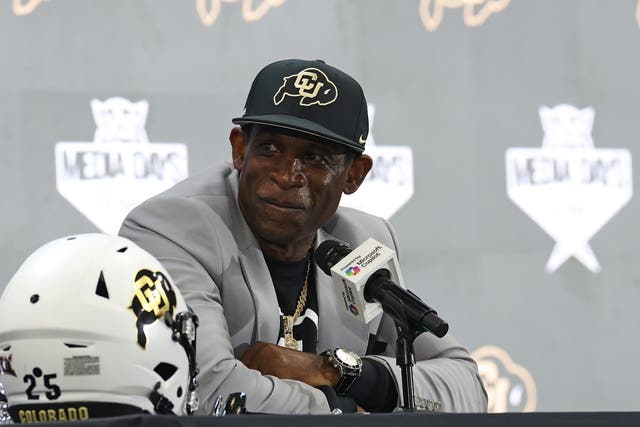Deion Sanders Is One of One — and His Fight Is a Lesson in Purpose

With a kind of joy, sincerity and charisma that can only come from Deion Sanders, Colorado's head coach sat at a press conference on Monday, fighting back tears beside two medical professionals he credited with helping save his life.

They told the world that Sanders was diagnosed with bladder cancer earlier this summer, underwent a procedure to remove it after a malignant tumor was found, and is now cancer-free.
Dr. Janet Kukreja, director of urological oncology at the University of Colorado Cancer Center, voiced the two words that fans of Coach Prime and Colorado athletics wanted to hear: "It's beaten."
For weeks, speculation and rumors had run amok about the health of Sanders, one of the most prominent and ubiquitous figures in the sport. But there was no arguing he’d become reclusive at a moment when coaches were out recruiting and politicking for the game. The 57-year-old Sanders had largely been out of the public eye since the conclusion of spring practice.
Sanders' oldest son, Deion Sanders, Jr., was the first and only family member to tell the public that his father was in the midst of a battle he could only reveal so much about, posting a video on social media earlier this month when he was heard saying his father was dealing with a health concern and making it clear that any prayers would be welcomed.
For the coach who brought Colorado its first nine-win season since 2016, its first Heisman winner since 1994 and a national presence and relevancy that the program hasn’t enjoyed since winning a share of the 1990 national championship, the return of questions about Sanders' health was challenging. This is especially true after Sanders, who had life-saving surgery to remove blood clots just two years ago, signed a contract to stay in Boulder that will see him make more than $10 million annually.
However, his sons no longer play football for a team he coaches. Travis Hunter, the 2024 Heisman winner, is at NFL training camp with the Jacksonville Jaguars. If Sanders were to walk away and manage his health, even for a little while, the sport would’ve felt his absence.

After all, there is not another coach in the country who could succeed in hosting his own talk show on Tubi, earn late-night television spots during the offseason to promote his book and coach a program at the Power 4 level.
We know this is true because he’s the only person who has done it. Just like he is the only person to play in the World Series and the Super Bowl. Just like he’s the only Power 4 coach to begin his career as a college football head coach without a single stop as an assistant at the NFL or college level.
Sanders is one of a kind. He is unique. He is truly one of one.
However, from the first week of May through the last week of July, Sanders only met the obligations he had to, including an appearance at Big 12 Media Days, where he dismissed questions about his health and mustered a robust argument for a salary cap in college football.
"I’m not here to talk about my health," Sanders said at Big 12 Media Days. "I’m here to talk about my team."

He did that, while breaking protocol in the process.
Traditionally, coaches who are overseeing a QB competition elect not to bring either, allowing folks who write and talk about the sport for a living to draw their own conclusions. Instead, he brought both Kaidon Salter and Julian Lewis, setting the narrative that he truly feels good about either of them starting Week 1 against Georgia Tech.
And he did all of that while recovering from the kind of surgery that can be life-threatening, making the decision not to tell anyone outside a close group of family and friends about it.
"I’m truly thankful that God is so good," Sanders said as he stared up at the sky, put his hands in a prayer position and took a deep pause to gather himself. "You have no idea how good God has been for me to be here."
Sanders got to tell his story, but I hope he won’t forget that only he has the ability to call a news conference on a Monday afternoon in late July to tell the world about his fight with cancer, and we all came running. I hope he will remember we were here to celebrate his victory with him. Hold him in our prayers, walk through life doing the best we can for each other, live our lives as he has.
Coach Prime has lived his life with passion, with drive. He has decided he will make the rest of his life about coaching the sport he played better than almost everybody else who has ever touched a football because he believes it is the best way to reach the most people and develop the best men the world could know.
"I always knew I was going to coach again," Sanders said on Monday. "It was never in my spirit, in my heart, that God wouldn't allow me to coach again. (I) never thought like that."
Let what Sanders endured over the past couple of months and his ability to find purpose in everything he does serve as a reminder to us all.
This life we live can feel unbearable, unfair and unkind. It takes from many more than it gives. But, today, we learned once again, it can give back. It can give us back perspective when we can’t see past our inconveniences and our tragedies. It can give us purpose if we feel we have no merit, no position to play in its game. It can give us back our heroes when it lays them low so that we might watch them fight back with grace, honor and integrity.
Coach Prime, one of the biggest names in college football, has his values personified and his faith displayed constantly. He beat cancer with a full-time job in one of the most pressurized environments sports has to offer. Because of course he did.
Because he’s Prime.
RJ Young is a national college football writer and analyst for FOX Sports and the host of the podcast "The Number One College Football Show." Follow him at @RJ_Young.
Want great stories delivered right to your inbox? Create or log in to your FOX Sports account, and follow leagues, teams and players to receive a personalized newsletter daily!

Fox News














